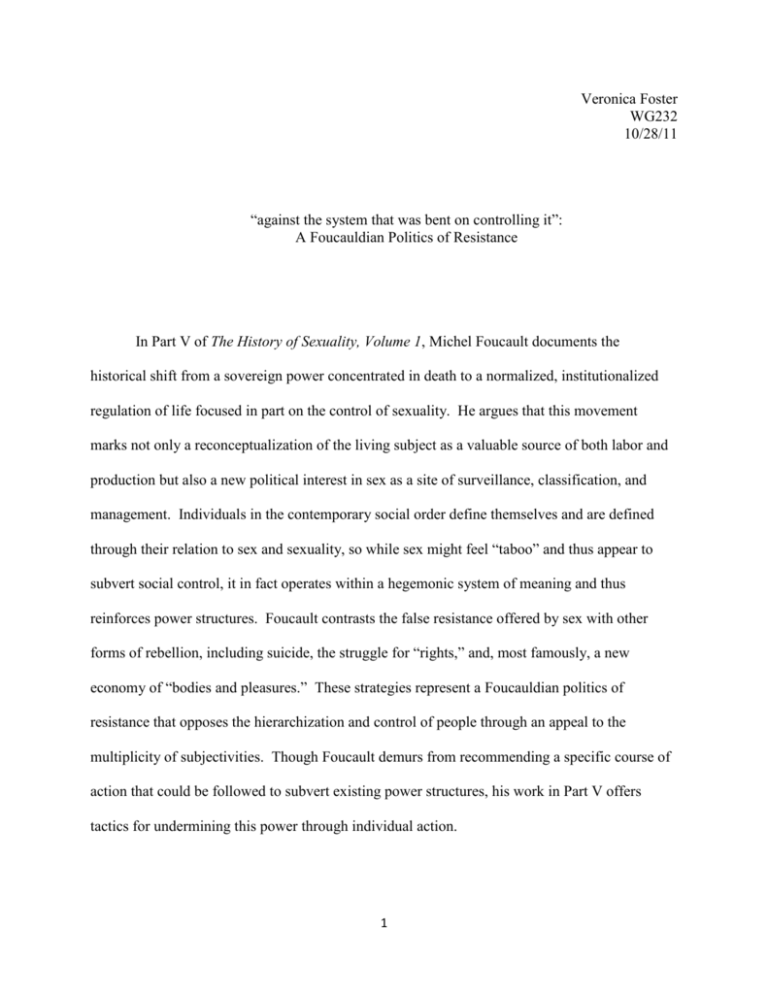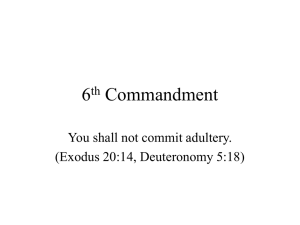Women`s Gender Studies, Intermediate
advertisement

Veronica Foster WG232 10/28/11 “against the system that was bent on controlling it”: A Foucauldian Politics of Resistance In Part V of The History of Sexuality, Volume 1, Michel Foucault documents the historical shift from a sovereign power concentrated in death to a normalized, institutionalized regulation of life focused in part on the control of sexuality. He argues that this movement marks not only a reconceptualization of the living subject as a valuable source of both labor and production but also a new political interest in sex as a site of surveillance, classification, and management. Individuals in the contemporary social order define themselves and are defined through their relation to sex and sexuality, so while sex might feel “taboo” and thus appear to subvert social control, it in fact operates within a hegemonic system of meaning and thus reinforces power structures. Foucault contrasts the false resistance offered by sex with other forms of rebellion, including suicide, the struggle for “rights,” and, most famously, a new economy of “bodies and pleasures.” These strategies represent a Foucauldian politics of resistance that opposes the hierarchization and control of people through an appeal to the multiplicity of subjectivities. Though Foucault demurs from recommending a specific course of action that could be followed to subvert existing power structures, his work in Part V offers tactics for undermining this power through individual action. 1 Foucault’s delineation of the historical shift from a politics of power located in the sovereign right to mete out death to a more diffuse “power…situated and exercised at the level of life” (137) serves to explain the increasingly rigorous surveillance and management of sexuality that characterizes contemporary society. During the eighteenth century, power, once the possession of a select few and “exercised mainly as a means of deduction” (136), became more diffuse, operating not only within institutions like the family and police force but also as a normalizing technique working within the “sphere of economic processes” (141). Following this transformation of the forms and functions of power, the human body was reimagined as a source of both labor and production, capable of contributing to a workforce and of creating new life. Sex, then, represents a significant locus of power because: “It fitted in both categories at once, giving rise to infinitesimal surveillances, permanent controls, extremely meticulous orderings of space, indeterminate medical or psychological examinations, to an entire micro-power concerned with the body. But it gave rise as well to comprehensive measures, statistical assessments, and interventions aimed at the entire social body or at groups taken as a whole. Sex was a means of access both to the life of the body and the life of the species.” (146) The movement from “a symbolic of blood to an analytics of sexuality” (148)—from a power concentrated in death to one concentrated in life—resulted in an increased concern with naming and documenting individual presentations of sexuality, in part because sex provided, and continues to provide, a way to access both the life of an individual and the life of a population. In contemporary society, power operates not only through the surveillance and categorization of sexualities, but also through a valorization of the act of sex as a key component to identity formation. Though Western culture often conceives of sex as “natural,” and thus divorced from the politics of power, Foucault argues that “sex is the most speculative, most ideal, and most internal element in a 2 deployment of sexuality organized by power” (155). What kinds of acts are done with whom now speaks to who we are, and not just what we like. Sex functions as a way to create meaning within a power structure predicated on labels and on hierarchies: “It is through sex—in fact, an imaginary point determined by the deployment of sexuality—that each individual has to pass in order to have access to his own intelligibility…to the whole of his body…to his identity” (156). Despite the fact that sex operates within the hegemonic structure of sexuality, it appears to many to be “rooted in a specific and irreducible urgency which power tries as best it can to dominate (155). In other words, sex feels subversive even though it reifies existing power structures. Foucault notes that “We must not think that by saying yes to sex, one says no to power; on the contrary, one tracks along the course laid out by the general deployment of sexuality” (157). The false resistance offered by the act of sex conceals the insidiousness of a power that names acts in order to control them and privileges certain sexualities over others in an attempt to fully harness the power of the living body. Though sex, at least as it is conceived of in the contemporary historical moment, offers only a “mirage” (157) of individual power and resistance, Foucault identifies other actions that have the potential to disrupt power structures; among these is suicide. Following the transformation of power from a politics of death to “one addressed to the body, to life, to what causes it to proliferate, to what reinforces the species, its stamina, its ability to dominate, or its capacity for being used” (147), the role of death in Western society changed dramatically. Advances in technology interrupted the cycles of famine and disease that previously characterized life, and the reconceptualization of the human body as a valuable living asset resulted in a politics “increasingly informed by the naked question of survival” (137). As power became more invested in the preservation of life on the level of both the individual and the population, death began to threaten the totality of power rather than serve as its representation. 3 In a culture where every aspect of life is carefully coded and controlled, “death is power’s limit, the moment that escapes it; death becomes the most secret aspect of existence, the most ‘private’” (138). Given power’s dependence on maintaining life: “It is not surprising that suicide—once a crime, since it was a way to usurp the power of death which the sovereign alone…became, in the course of the nineteenth century, one of the first conducts to enter into the sphere of sociological analysis; it testified to the individual and private right to die, at the borders and in the interstices of power that was exercised over life.” (139) Suicide represents the reclamation of an act so inherently private that even the diffuse power of the modern age cannot control it, except to include death in the list of statistics to be avoided. As such, it serves as a form of resistance because it takes the individual prerogative not to comply with society’s insistence on life to its logical extreme. Foucault identifies the struggle for “rights” as another site of resistance that could potentially undermine existing power structures. As a rejoinder to the increased management of life as a means of production and labor, he notes that some began to advocate for: “The ‘right’ to life, to one’s body, to health, to happiness, to the satisfaction of needs, and beyond all the oppressions or ‘alienations,’ the ‘right’ to rediscover what one is and all that one can be, this ‘right’—which the classical juridical system was utterly incapable of comprehending—was the political response to all these new procedures of power which did not derive, either, from the traditional right of sovereignty.” (145) The individualistic language of “rights” functions as a challenge to a “normalizing society” (144) that values conformity over personal difference. Unlike suicide, which existed before the transformation of power and changed only in meaning, not in form, the new emphasis on basic human rights represents a major ideological shift from previous dreams and desires: “One no longer aspired toward the coming of the emperor of the poor, or the kingdom of the latter days, or even the restoration of our imagined ancestral rights; what was demanded and what served as 4 an objective was life, understood as the basic needs” (145). At the same time that power discovered the value of the careful management of life and its possibilities, “life as a political object was in a sense taken at face value and turned back against the system that was bent on controlling it” (145). The political response to a system of power that exploited the labor and productive powers of living subjects was to reclaim life as the custody of the individual. The most well-known approach that Foucault offers to combat the increasing surveillance and categorization of life, and especially of sexuality, is the nebulous notion of “bodies and pleasures.” After arguing that the idea of sex is in fact integral to the deployment of sexuality because it encompasses not only biological impulses but also “an instinct which, through its peculiar development and according to the objects to which it could become attached, made it possible for perverse behavior patterns to arise and made their genesis intelligible” (153), Foucault notes that only by rejecting the labeling and hierarchization of sexual acts can the control of sexuality be resisted. He writes that: “It is the agency of sex that we must break away from, if we aim—through a tactical reversal of the various mechanisms of sexuality—to counter the grips of power with the claims of bodies, pleasures, and knowledges, in their multiplicity and their possibility of resistance. The rallying point for the counterattack against the deployment of sexuality ought not to be sex-desire, but bodies and pleasures.” (157) As with suicide and the struggle for rights, the “different economy of bodies and pleasures” (159) that Foucault recommends resists the diffuse, normalizing power of contemporary society through an appeal to individuality and multiplicity. Sex, at least in its current form, requires a set of identifiers—homosexual, heterosexual, monogamous—to achieve meaning within the symbolic order of sexuality. By contrast, the concept of “bodies and pleasures,” though unimaginable in this age when sex and sexuality represent the crux of a power exercised in all 5 areas of life, would value the preferences of all individuals, and not just those whose sexual acts maintain the supremacy of a power invested in life. Though Foucault’s work in Part V of The History of Sexuality, Volume I offers no easy answers for how to oppose the diffuse power over life that he so compellingly delineates, it does reveal several strategies of resistance. Suicide, the struggle for “rights,” and the idea of “bodies and pleasures” represent three distinct tactics that subvert the normalizing power of contemporary society through a return to individuality and multiplicity. Unlike the false resistance offered by sex, which serves to reify existing power structures, these strategies confront power through its greatest interest and investment: life. Suicide threatens the supremacy of this power by taking the privacy of death to its extreme, the rhetoric of “rights” asserts the individuality of human existence, and “bodies and pleasures” rejects the categorization of sex through an appeal to multiplicity. Together, these approaches offer the hope of resistance and reveal the radical measures that would have to be taken in order to subvert a power that operates within almost every aspect of life. 6 Works Cited Foucault, Michel. The history of sexuality. New York: Vintage, 1990. Print. 7






